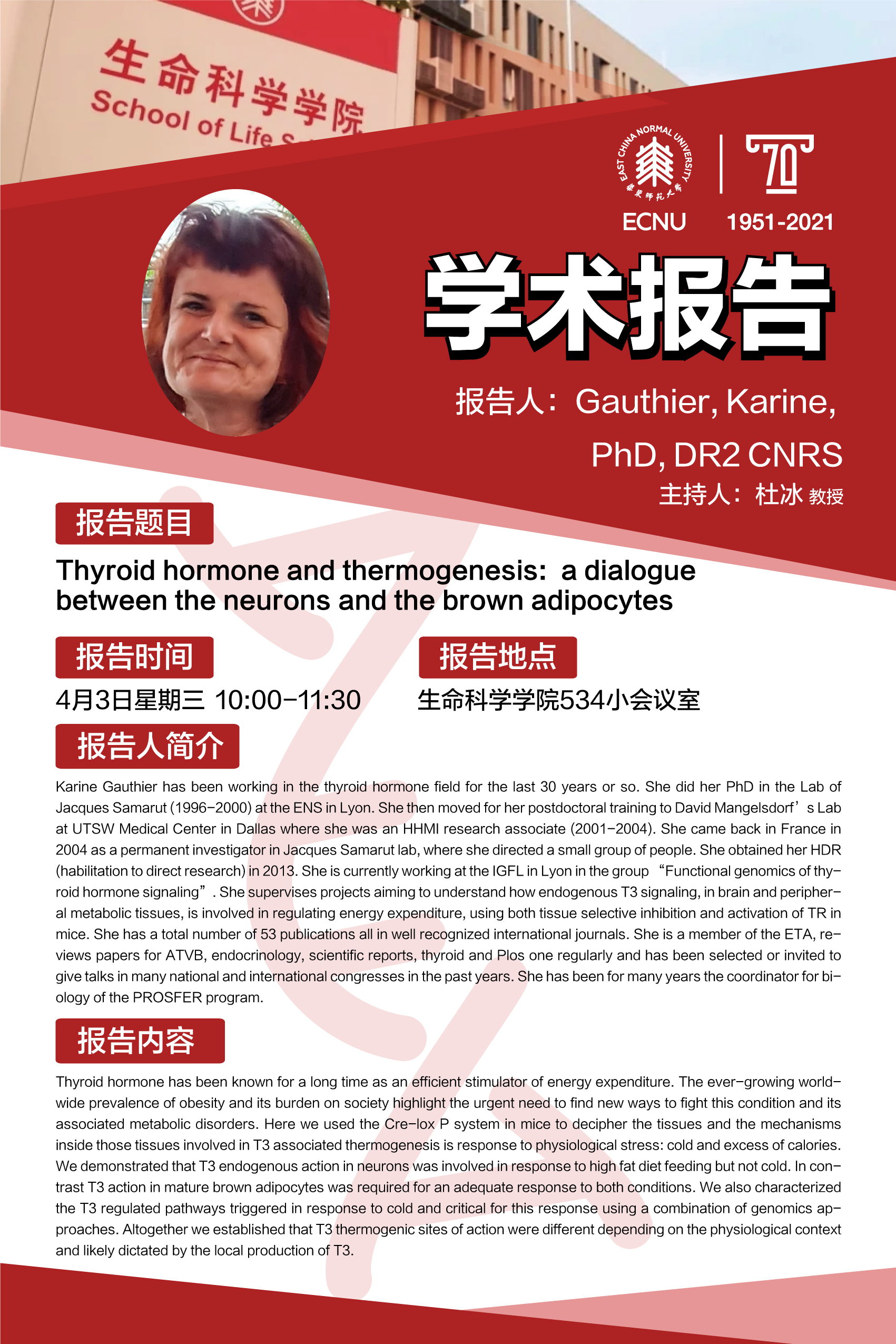报告题目:Thyroid hormone and thermogenesis: a dialogue between the neurons and the brown adipocytes
报 告 人:Gauthier, Karine, PhD, DR2 CNRS
主 持 人:杜 冰 教授
报告时间:4月3日上午10:00-11:30
报告地点:闵行校区生命科学学院534小会议室
报告人简介:
Karine Gauthier has been working in the thyroid hormone field for the last 30 years or so. She did her PhD in the Lab of Jacques Samarut (1996-2000) at the ENS in Lyon. She generated during these years several of the knock-out mice currently used in a number of labs to study Thyroid Hormone Receptors (TR) function. She participated to the early collaborative effort to characterize those mice, for a better understanding of TR roles during early postnatal development. She then moved for her postdoctoral training to David Mangelsdorf’s Lab at UTSW Medical Center in Dallas where she was an HHMI research associate (2001-2004). She kept on studying there nuclear receptors function using knock-out mouse models. She had special interest in finding new ligands for PXR and in studying the role of LXR in fat metabolism and macrophage functions. She came back in France in 2004 as a permanent investigator in Jacques Samarut lab, where she directed a small group of people. She studies the role of Thyroid Hormones and TR in the control of lipid and glucose metabolism in peripheral tissues and their involvement in metabolic diseases development. She obtained her HDR (habilitation to direct research) in 2013. She is currently working at the IGFL in Lyon in the group “Functional genomics of thyroid hormone signaling”. She supervises projects aiming to understand how endogenous T3 signaling, in brain and peripheral metabolic tissues, is involved in regulating energy expenditure, using both tissue selective inhibition and activation of TR in mice. Her most recent works used a combination of mouse genetics, genomics and classical physiology, to determine how thyroid hormone signaling respectively in neurons and brown adipocytes impacts the thermogenic responses to cold exposure and western diet feeding. We classically used metabolic phenotyping of tissue selective mouse mutants as well as identification of gene networks directly regulated by thyroid hormone in the different tissues under the different stressors, to tackle these questions. She is involved in many collaborations to study how TR regulate different aspects of metabolism in other tissues including skeletal muscle and liver.
She has been the supervisor of many master and PhD students. She has a total number of 53 publications all in well recognized international journals.
She is a member of the ETA, reviews papers for ATVB, endocrinology, scientific reports, thyroid and Plos one regularly and has been selected or invited to give talks in many national and international congresses in the past years.
She has been for many years the coordinator for biology of the PROSFER program, an exchange program for student between the ECNU in Shanghai and the ENS Lyon.
报告简介:
Thyroid hormone has been known for a long time as an efficient stimulator of energy expenditure. The ever-growing worldwide prevalence of obesity and its burden on society highlight the urgent need to find new ways to fight this condition and its associated metabolic disorders.
Thyroid hormone has been known for long as an efficient stimulator of energy expenditure. However, there is still controversy concerning the mechanisms at play. Thyroid hormone acts via binding to TR and TR, two nuclear receptors that are T3 inducible transcription factors expressed in merely every tissue. It has been previously shown that T3 could stimulate thermogenesis either directly in the peripheral metabolic tissue or via its central action in the hypothalamus. Here we used the Cre-lox P system in mice to decipher the tissues and the mechanisms inside those tissues involved in T3 associated thermogenesis is response to physiological stress: cold and excess of calories. We selectively inactivate T3 signaling in either neurons or mature adipocytes and test how it affects the response to each one of the thermogenesis stresses. We demonstrated that T3 endogenous action in neurons was involved in response to high fat diet feeding but not cold. In contrast T3 action in mature brown adipocytes was required for an adequate response to both conditions. We also characterized the T3 regulated pathways triggered in response to cold and critical for this response using a combination of genomics approaches.
Altogether we established that T3 thermogenic sites of action were different depending on the physiological context and likely dictated by the local production of T3.
